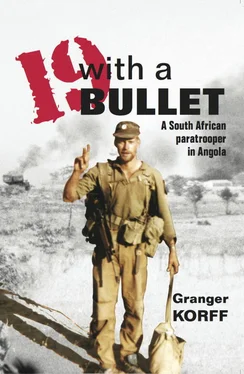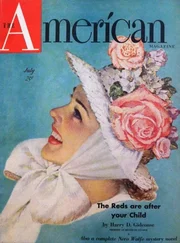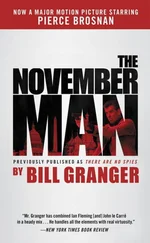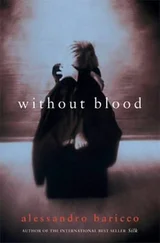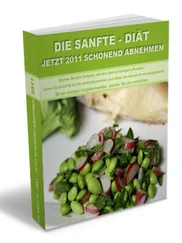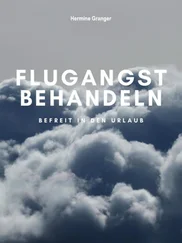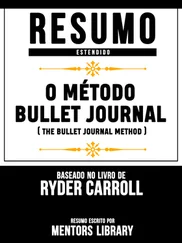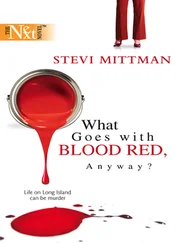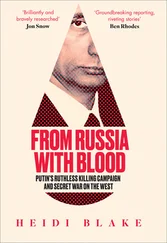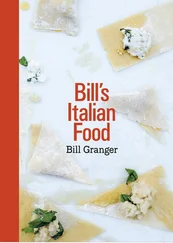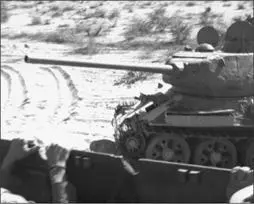
Paras drive past a knocked-out FAPLA tank.
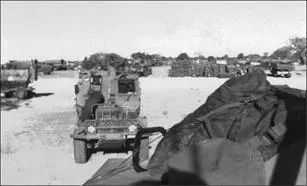
Mountains of FAPLA war matériel, captured during Operation Protea , is stacked behind the South African APCs.
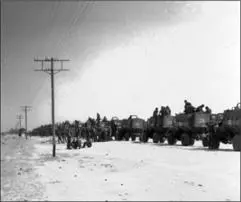
Mechanized Fighting Group 20, back in South West Africa after three weeks in Angola on Operation Protea , the biggest South African military operation since the Second World War.
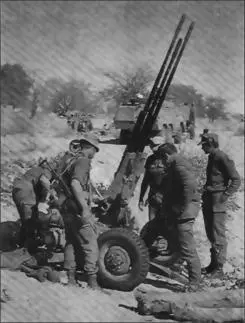
From an Afrikaans newspaper cutting: SADF troops inspecting a captured FAPLA anti-aircraft artillery piece.
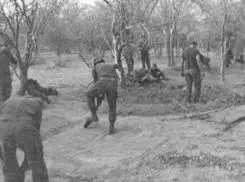
Digging in for the night in Angola during Operation Ceiling .
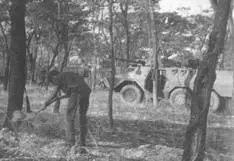
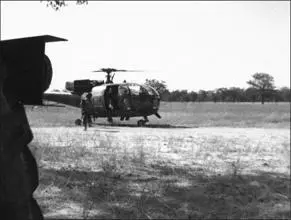
A SWAPO turncoat being dropped off with the paras in Angola. The following day he led the paras to SWAPO’s ‘Navy HQ’, where the paras sprung a dawn ambush and killed all 17 SWAPO guerrillas in situ.
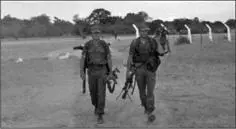
John Delaney and Granger Korff about to emplane at Ongiva after several weeks of continuous fighting around the airstrip (in the background).
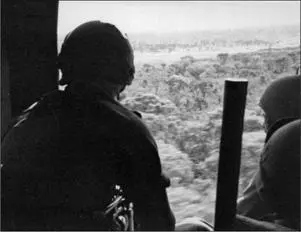
Valk 4 flying in fast to a contact during Op Daisy , Angola, November 1981.
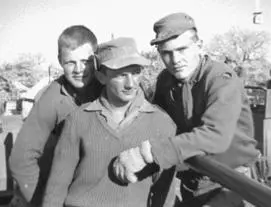
Kurt Barnes, John ‘The Fox’ and ‘Stan the Man’.
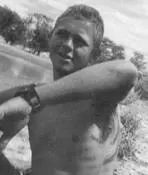
An H Company soldier shows off his shrapnel wounds.
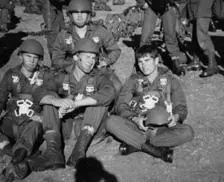
Kitted up.
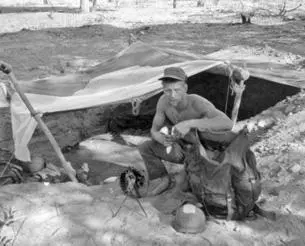
The author by his well-constructed bivvy of branches and stolen body bags. During Operation Daisy, D company was held in reserve but ended up fighting in the bloodiest contact.
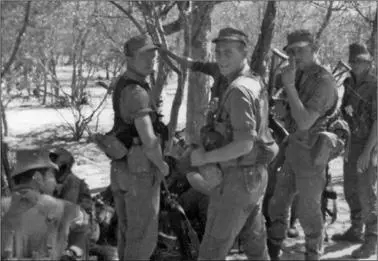
Kruger ( seated left ), ‘The Fox’, Stan, Korff and mortar man Kleingeld taking a break in Angola.
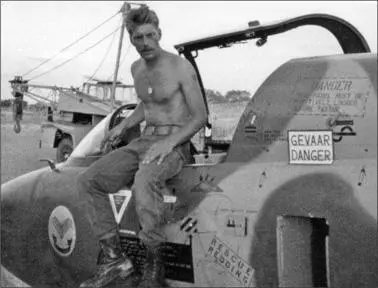
The author sitting on a SAAF Impala jet that had made a successful emergency landing in an open chana close to Ondangwa air force base. The paras stood guard until the plane was retrieved.
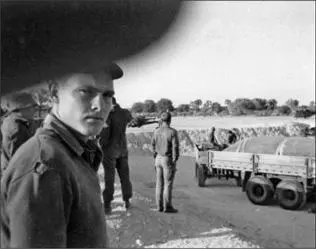
Stan and who-knows-whose finger—probably Gungie’s.
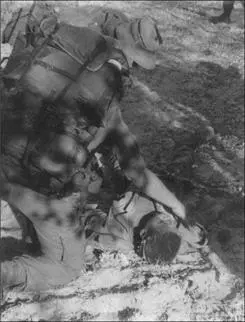
H Company troops search the corpse of a SWAPO cadre. The paras had walked into an ambush but turned it around when they charged their assailants.
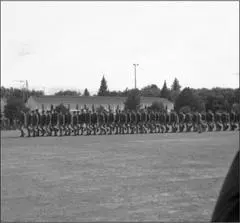
Final klaar out parade.
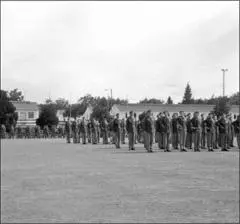
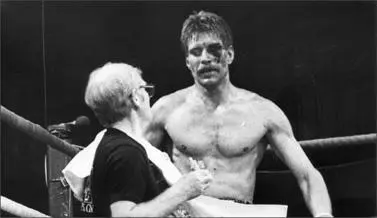
Korff with a deep cut. He fought on to lose on a points’ decision.
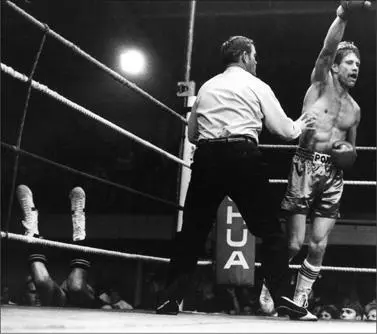
Granger Korff knocking an opponent out of the ring, raising his arm in victory. Note his opponent’s feet sticking up in the front row—coincidently where the judges are seated.
Granger Korff. 1960—Cassius Clay won Olympic gold in Rome, the Beatles made their debut in Germany, apartheid was ‘booming’ in South Africa and Granger Korff was born on the East Rand near Johannesburg to a realtor father and budding-actress mother. “The apartheid system was sewn tight as a Zulu drum and the country moved to a slow beat,” he says of the times. He grew up in the mining town of Benoni, a quiet child initially, before ‘enjoying’ a colourful school career as a musician and quick-fisted rebel, attending a string of different schools for a string of different reasons. He graduated in 1979—alone from the public library.
In 1980 he volunteered for the crack 1 Parachute Battalion, becoming renowned for being at the forefront of the action in the bush war escalating on South Africa’s northern borders. After an action-packed two years fighting in the African bush, Granger took a newfound anger with him to the professional boxing ring where he quickly gained a reputation as one of the most exciting young middleweight fighters in the country.
In 1985, plagued by his demons from the bush war, he travelled to the USA on a six-month boxing/vacation walkabout, haunting the mean streets of Los Angeles, scrapping and boxing to survive. Ike Turner and Mickey Rourke were his drinking buddies and he almost became Jake ‘The Raging Bull’ LaMotta’s son-in-law. Twenty-four years later, Granger still lives in LA, where he runs a small plumbing business.
Other books by 30° South Publishers on the South African Border War
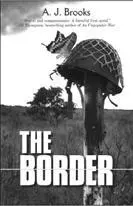
The Border
A.J. Brooks
978-1-920143-10-7; R145.00; Softback;
234 x 153mm; 304pp
“There was an odd combination of anxiety and reluctant anticipation prevalent among the new troops as they made final preparations. Their dismay was evident as the section leader discarded most of the food-carrying compartments and altered the webbing to carry at least seven water bottles and as many magazine pouches. The harsh reality of Owamboland thwarted the infantry school’s textbook, for this was war… war in a thirsty land.”
Читать дальше
